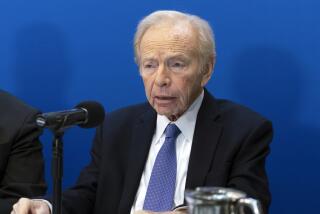Lieberman Seeks Postwar Plan
- Share via
WASHINGTON — Sen. Joseph I. Lieberman (D-Conn.) called on President Bush on Wednesday to focus more on his plans to rebuild a postwar Iraq, saying that a clear statement of long-term U.S. intentions could broaden support for a military campaign to disarm Saddam Hussein’s regime.
Lieberman, who is seeking the Democratic 2004 presidential nomination, has strongly backed Bush’s push to force the Iraqi president to destroy his suspected weapons of mass destruction. But that stance has put Lieberman increasingly at odds with his party’s liberal activists, who are highly influential in the presidential nominating process.
His speech at the Council on Foreign Relations in Washington appeared an effort to distance himself, at least in part, from Bush’s Iraq policy. The senator’s remarks also came just hours before the president delivered a speech in which he emphasized his hope that a new government in Iraq could “serve as a dramatic and inspiring example of freedom to other nations” in the Middle East.
Lieberman criticized Bush for not making a greater effort in recent months to “advance a new vision” for regional peace and prosperity in the Middle East, and said the president “must re-engage without delay.”
Lieberman also said much was at stake in Bush’s ability to convince the world -- especially the Arab nations -- that America’s motives are honorable in the confrontation with Hussein.
“This is so important -- not just to meet the immediate postwar security threats -- but to counter the serious suspicions that exist in America and around the world about our motives and what our intentions are in Iraq,” Lieberman said.
In answering questions after his speech, Lieberman chided Bush for having failed, in his view, to make a more compelling case for war -- a shortcoming that he said was “by and large” responsible for the recent worldwide antiwar demonstrations.
Lieberman also offered his own suggestions for a postwar Iraq.
He said Bush should work with allies to name an “international” civilian administrator, supported by a global security force, to govern the oil-rich nation.
Naming an American administrator would be a mistake because it would put the United States “in the position of an occupying power, not a liberator,” Lieberman said.
U.S. officials have held discussions with allies about governing a postwar Iraq through a coalition of nations. But depending on the degree of international support for a possible war, the United States is prepared to have the U.S. military run postwar Iraq for a short time before handing off its administration to an American civilian.
Lieberman said that a lasting peace in Iraq would require avoiding certain mistakes made following the military campaign in Afghanistan. One such mistake, he said, was Bush’s rejection of NATO military support in the operations there to oust the Taliban regime, which had harbored Osama bin Laden and his Al Qaeda terrorist network.
He also called for “a clear process and timetable” for turning over governing to Iraqis.
“If what ultimately replaces Saddam appears to the world to be indefinite occupation, another dictatorship, or a weak and ineffective ad hoc government, it will breathe new life into the most cynical claims about American purposes -- and put our long-term security right back in jeopardy,” Lieberman said.
More to Read
Get the L.A. Times Politics newsletter
Deeply reported insights into legislation, politics and policy from Sacramento, Washington and beyond. In your inbox twice per week.
You may occasionally receive promotional content from the Los Angeles Times.










